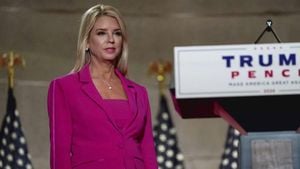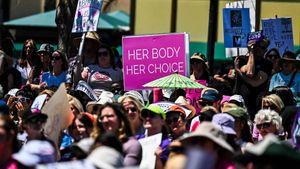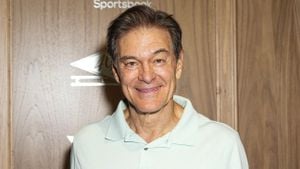President-elect Donald Trump has made headlines again, this time with a flurry of Cabinet nominations announced on Friday evening, just weeks before his inauguration. This round of picks marks a decisive move to solidify his administration after his victory, offering insights not only about his leadership style but also about the priorities he intends to pursue during his term.
Among the prominent appointments is Scott Turner, the former NFL player turned Texas state representative, who will now head the Department of Housing and Urban Development (HUD). Turner, who previously served on Trump’s White House Opportunity and Revitalization Council, is notable as Trump’s only Black Cabinet nominee. His selection indicates Trump's intent to address housing issues, albeit through the lens of his prior experience.
Another significant pick is Lori Chavez-DeRemer, who has been tapped to lead the Department of Labor. Despite her recent electoral defeat, she is seen as pro-labor, which seems somewhat contradictory for largely anti-union administration policies. Chavez-DeRemer was one of only three Republicans to support the PRO Act, showcasing her support for labor rights at a time when such positions are often fraught with political risks.
The mix of choices also brought back familiar faces to Trump’s inner circle. Sebastian Gorka, known for his alt-right views, has been appointed as deputy assistant to the president and senior counterterrorism adviser. Trump's recognition of Gorka’s advocacy for the America First agenda reflects his commitment to maintaining his core messaging and base support.
Trump's health-related nominations have also grabbed attention. Fox News contributor and doctor Janette Nesheiwat will take on the role of surgeon general, leveraging her experience through the COVID-19 pandemic to lead America’s health initiatives moving forward. This nod to media personalities could signal Trump’s reliance on familiar faces to navigate public health challenges post-pandemic.
Another significant appointment is Johns Hopkins surgeon Marty Makary as the head of the Food and Drug Administration (FDA). His controversial take on health policies, particularly his belief advocating for natural immunity as the key to ending the pandemic, suggests Trump’s preference for officials who may challenge the traditional scientific consensus.
Also, Dave Weldon has been nominated to oversee the Centers for Disease Control and Prevention (CDC), bringing forth Trump's commitment to reevaluate public health strategies. This trio will join Robert F. Kennedy Jr., who will lead the Department of Health and Human Services, to manage the nation’s health, pending their confirmation.
Trump’s Cabinet reshuffle didn’t stop there. He has also appointed Russ Vought, the architect behind Project 2025, to run the Office of Management and Budget, emphasizing the administration's focus on fiscal conservatism. Meanwhile, hedge fund manager Scott Bessent has been earmarked for Treasury secretary, indicating the administration's inclination toward economic policies drawing from Wall Street’s influence.
The swift pace and strategic intent behind these nominations highlight how Trump aims to assemble a diverse team for various challenges—political, health-related, and economic—as he steps back onto the national stage. This sense of urgency to flesh out his administration indicates he's preparing for immediate and effective governance right from the get-go. Trump's approach brings to mind his past administration, where controversies and strong personalities were often the norm.
Critics of Trump's picks have voiced concerns about the potential impacts of his selections, especially internationally. European capitals are reportedly on high alert, perceiving this Cabinet as one reflecting extreme right-wing ideologies, raising fears of renewed hostilities or isolationist policies.
Reactions to these appointments have been mixed, underscoring the contentious climate surrounding Trump even before he officially takes office. Some allies express confidence, asserting these nominations will usher in prioritized agendas, particularly around policies affecting labor and public health. For those within Trump's circle, the selection of cabinet members who echo his America First ideology might reinforce their view of returning to ‘true American values’.
Despite the enthusiasm from supporters, members of the opposition have been quick to criticize. Concerns arise about the relationships and experiences of this new team, with some labeling the appointments as alarming due to the extreme notions many of Trump's pick are known for. The worry is palpable among critics who argue such individuals are ill-suited for managing sensitive government departments.
Overall, Trump's latest Cabinet appointments reflect his signature style of surrounding himself with loyalists and polarizing figures. Looking forward, these choices will not only shape the future direction of his second administration but also set the tone for how he handles the ensuing challenges. With such significant nominations, the upcoming months will be telling as Trump navigates the transition from candidate to the leader of the free world.



